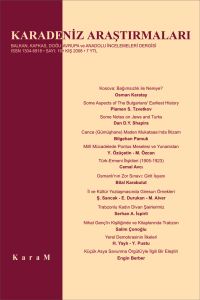Canca (Gümüşhane) Maden Mukataası'nda İltizam Uygulaması
The Land Tenure Application of Canca Mining Muqata'ah (1600-1650)
Author(s): Bilgehan PamukSubject(s): Economy, 16th Century, 17th Century, Fiscal Politics / Budgeting
Published by: Karadeniz Araştırmaları Merkezi
Keywords: Canca; Mine; Muqata'ah; Land Tenure; Financial;
Summary/Abstract: The taxing principle related to the sources of income used to eventuate in two basic ways. First one was by officials who are paid salaries and who can be seen in almost every country, and the other way was to hand over the duty of tax collecting to private enterprises under certain circumstances. The land tenure, which is an indispensible method for financial necessities, and whose various forms are more or less seen in different countries, started to be applied in Ottomans within the first hundred years of the establishment of the government. Land tenure forms a whole with crown land system by accomplishing one another, but from time to time they have existed separately as two opposing elements. The basic factor in the emergence of land tenure was the necessity of the putting tax rights into the financial mechanism in order to pay the increasing expenses of the government. Through the end of the 16th century, muqata'ah is generally assumed as land tenures. The Canca mine muqata'ah, Gümüşhane, from which valuable metals are mined, is operated either as custody or as land tenure from time to time. With the idea of covering the expenses, by an annual price, which is de-cided with a competitive auction and whose certain percentage is paid in cash, and by showing a guarantor, the operation of the Canca muqata'ah used to be given as land tenure for a limited period of time with its profits and deficits. In this study, the application of land tenure in Canca mine muqata'ah, as a more advantageous way of operation when compared with operating on deposit, is analysed.
Journal: Karadeniz Araştırmaları
- Issue Year: 2008
- Issue No: 16
- Page Range: 39-48
- Page Count: 10
- Language: Turkish

